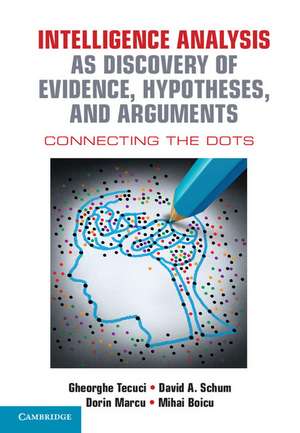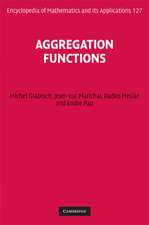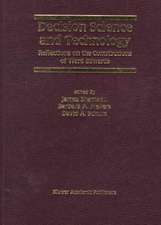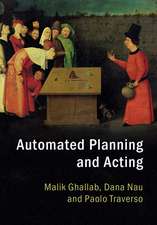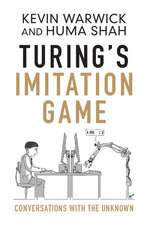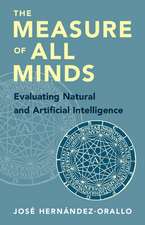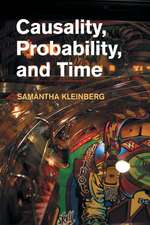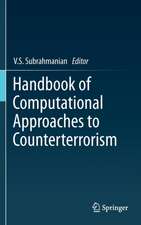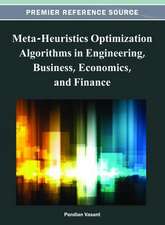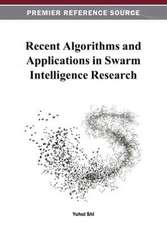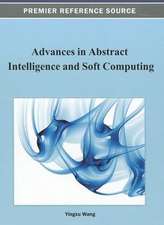Intelligence Analysis as Discovery of Evidence, Hypotheses, and Arguments: Connecting the Dots
Autor Gheorghe Tecuci, David A. Schum, Dorin Marcu, Mihai Boicuen Limba Engleză Hardback – 29 aug 2016
Preț: 418.93 lei
Preț vechi: 523.66 lei
-20% Nou
Puncte Express: 628
Preț estimativ în valută:
80.16€ • 83.92$ • 66.33£
80.16€ • 83.92$ • 66.33£
Carte disponibilă
Livrare economică 15-29 martie
Preluare comenzi: 021 569.72.76
Specificații
ISBN-13: 9781107122604
ISBN-10: 1107122600
Pagini: 272
Ilustrații: 111 colour illus. 23 tables
Dimensiuni: 184 x 261 x 17 mm
Greutate: 0.76 kg
Editura: Cambridge University Press
Colecția Cambridge University Press
Locul publicării:New York, United States
ISBN-10: 1107122600
Pagini: 272
Ilustrații: 111 colour illus. 23 tables
Dimensiuni: 184 x 261 x 17 mm
Greutate: 0.76 kg
Editura: Cambridge University Press
Colecția Cambridge University Press
Locul publicării:New York, United States
Cuprins
1. Intelligence analysis: 'connecting the dots'; 2. Marshaling thoughts and evidence for imaginative analysis; 3. Disciple-CD: a cognitive assistant for connecting the dots; 4. Evidence; 5. Divide and conquer: a necessary approach to complex analysis; 6. Assessing the believability of evidence; 7. Chains of custody; 8. Recurrent substance-blind combinations of evidence; 9. Major sources of uncertainty in masses of evidence; 10. Assessing and reporting uncertainty: some alternative methods; 11. Analytic bias; 12. Learning and reusing analytic expertise: beyond Disciple-CD.
Recenzii
'Intelligence Analysis as Discovery of Evidence, Hypotheses, and Arguments is a valuable resource for those interested in improving intelligence analysis. It provides both prospective and current intelligence analysts with an easy to read and understand explanation of a complex process, along with suggestions for how to more effectively implement that process. The examples from intelligence analysis and comparison to similar practices in other fields such as medicine, law, and law enforcement help the reader better understand how the interplay of evidence, hypotheses, and arguments can develop in different contexts. In that sense, this book provides a wonderful platform for improving intelligence analysis by learning and employing best scientific reasoning practices.' Stephen Marrin, James Madison University, Virginia
'This is an important work in several ways. The authors both help readers learn the basics and give advanced training in the craft of analytical reasoning by providing sophisticated tools to guide understanding of its strengths, its probabilistic nature, and its limitations. 'Deep' learning is what distinguishes experts from gifted amateurs; this book will help amateurs develop expert habits through guided learning and practice. I would not only recommend this book for students of intelligence, but also for students of law, journalism, and national security. The first several chapters should be mandatory reading for 'customers' and critics of intelligence, including policymakers, legislators, and professional journalists who are quick to ask 'why didn't you connect the dots?' while they themselves probably have no idea how difficult that may be.' Mark T. Clark, Director, National Security Studies, California State University, San Bernardino, and President, Association for the Study of Middle East and Africa (ASMEA)
'This is an important work in several ways. The authors both help readers learn the basics and give advanced training in the craft of analytical reasoning by providing sophisticated tools to guide understanding of its strengths, its probabilistic nature, and its limitations. 'Deep' learning is what distinguishes experts from gifted amateurs; this book will help amateurs develop expert habits through guided learning and practice. I would not only recommend this book for students of intelligence, but also for students of law, journalism, and national security. The first several chapters should be mandatory reading for 'customers' and critics of intelligence, including policymakers, legislators, and professional journalists who are quick to ask 'why didn't you connect the dots?' while they themselves probably have no idea how difficult that may be.' Mark T. Clark, Director, National Security Studies, California State University, San Bernardino, and President, Association for the Study of Middle East and Africa (ASMEA)
Notă biografică
Descriere
Using a flexible software system, this book teaches evidential and inferential issues used in drawing conclusions from masses of evidence.
